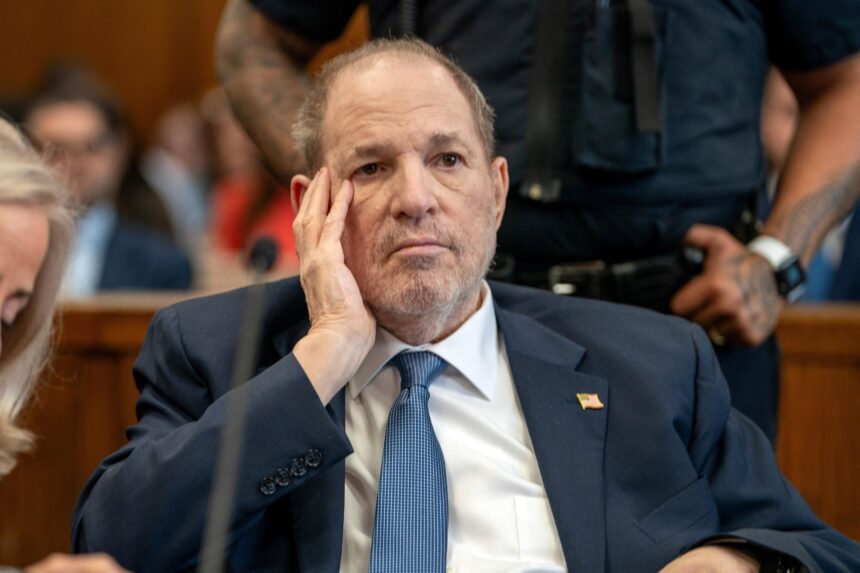Harvey Weinstein Retrial: Jury Begins Deliberations Amidst Intense Legal Battle
The jury has officially started deliberating in the widely followed retrial of Harvey Weinstein, the former film executive charged with multiple counts of sexual assault. This case has reignited public debate on accountability within the entertainment sector and highlights the ongoing challenges in addressing sexual misconduct allegations. After weeks of detailed testimonies and legal presentations, the jury now faces the critical task of assessing the evidence to determine Weinstein’s fate.
Deliberation Phase Commences in Weinstein’s Sexual Assault Retrial
Following extensive courtroom proceedings, the jury has entered the deliberation stage, tasked with evaluating charges that span several years and involve numerous alleged victims. Prosecutors have painted a picture of systematic abuse of power and coercion, while the defense maintains that all interactions were consensual and denies any criminal behavior.
Jurors have been given access to a comprehensive body of evidence,including:
- Detailed victim accounts describing the alleged assaults and their lasting effects
- Expert analyses focusing on psychological trauma and witness reliability
- Documentary materials such as communications and records from previous legal actions
| Charge | Current Status | Maximum Sentence |
|---|---|---|
| Criminal Sexual Act in the First Degree | Under Deliberation | Up to 25 years imprisonment |
| Third-Degree Rape | Under Deliberation | Up to 12 years imprisonment |
| Predatory Sexual Assault | Under Deliberation | Life imprisonment possible |
Final Arguments Highlight Disputes Over Witness Credibility
In their closing remarks,both prosecution and defense teams sought to sway the jury’s interpretation of the testimonies and evidence presented. The prosecution underscored the consistency found across multiple victim statements, arguing these patterns strongly indicate Weinstein’s culpability. They praised the bravery of the accusers and urged jurors to consider the profound emotional and psychological consequences of the alleged offenses when evaluating credibility.
Conversely, the defense challenged the trustworthiness of key witnesses, pointing out discrepancies and suggesting possible motives for false accusations. They emphasized the lack of physical proof and portrayed Weinstein as a target of a deliberate effort to tarnish his reputation. The table below summarizes the main points of contention regarding witness reliability:
| Prosecution Assertions | Defense Rebuttals |
|---|---|
| Multiple testimonies reveal consistent behavioral patterns. | Cross-examination exposed inconsistencies in witness statements. |
| Victim narratives supported by contextual evidence. | No physical evidence corroborates the allegations. |
| Emotional testimonies reflect genuine trauma. | Potential financial or reputational incentives for false claims. |
As deliberations proceed, both parties have urged jurors to carefully consider not only the factual evidence but also the complexities involved in interpreting human testimony, aware that their verdict will have far-reaching consequences.
Broader Implications of Jury Deliberations on Sexual Assault Litigation
The ongoing jury discussions in Weinstein’s retrial have sparked widespread analysis regarding how this case might influence future sexual assault prosecutions. The jury’s verdict could redefine prosecutorial and defense strategies, particularly in how evidence is presented and how witness credibility is assessed in sensitive cases. This trial’s outcome may also impact victims’ willingness to report abuse and the judicial standards applied to their testimonies nationwide.
Key areas under scrutiny include:
- Consent Interpretation: Jurors’ understanding of consent could set new legal precedents affecting upcoming cases.
- Weight of Corroborative Evidence: The balance between testimonial and physical evidence may shift in future trials.
- Influence of Media and Public Perception: The role of external narratives in shaping jury impartiality remains a critical concern.
| Focus Area for Jurors | Potential Long-Term Impact |
|---|---|
| Assessment of Survivor Testimony | Could establish new standards for validating victim accounts |
| Admissibility of Digital Evidence | May influence future evidentiary rules in sexual assault cases |
| Jury Deliberation Dynamics | Could prompt revisions in jury instruction and facilitation methods |
Expert Guidance for Jurors Navigating Complex Trials
Experts advise jurors in multifaceted cases like this to adopt a systematic and organized approach to deliberations. Breaking down the trial into smaller,manageable components helps prevent information overload and ensures thorough consideration of each charge and piece of evidence. Jurors are encouraged to consistently refer to the judge’s instructions to maintain adherence to legal standards and avoid bias.
Moreover,specialists stress the importance of fostering open,respectful communication among jurors. Constructive dialog and critical examination of assumptions contribute to more balanced and well-reasoned verdicts. Recommended strategies include:
- Maintaining detailed notes throughout the trial to aid memory during deliberations
- Seeking clarification on complex legal terms or instructions by submitting questions to the judge
- Understanding the principle of reasonable doubt and avoiding premature conclusions
- Balancing individual viewpoints with collaborative consensus-building
| Recommended Strategy | Expected Benefit |
|---|---|
| Segmented Analysis | Minimizes cognitive overload |
| Note-Taking | Enhances accuracy in recalling evidence |
| Clarification Requests | Ensures precise understanding of legal concepts |
| Open Dialogue | Promotes comprehensive and respectful discussion |
Conclusion: A Defining Moment in the Pursuit of Justice
As the jury deliberates in Harvey Weinstein’s high-stakes sexual assault retrial, the nation watches closely.This case not only determines the future of a once-powerful Hollywood figure but also serves as a critical touchstone in the ongoing dialogue about justice and accountability in the #MeToo era. The jury’s forthcoming decision will resonate far beyond the courtroom, potentially shaping the landscape of sexual assault litigation for years to come.










